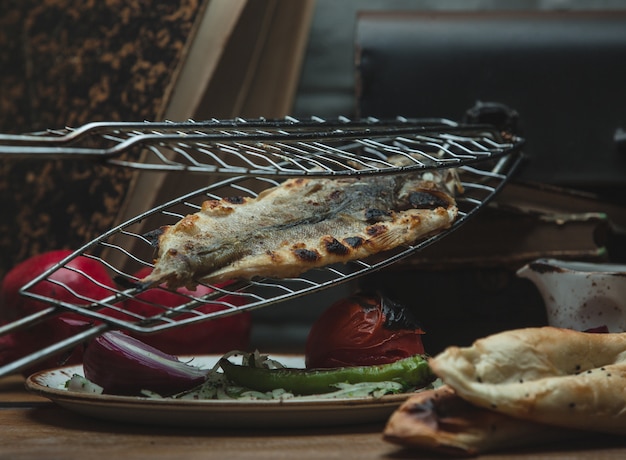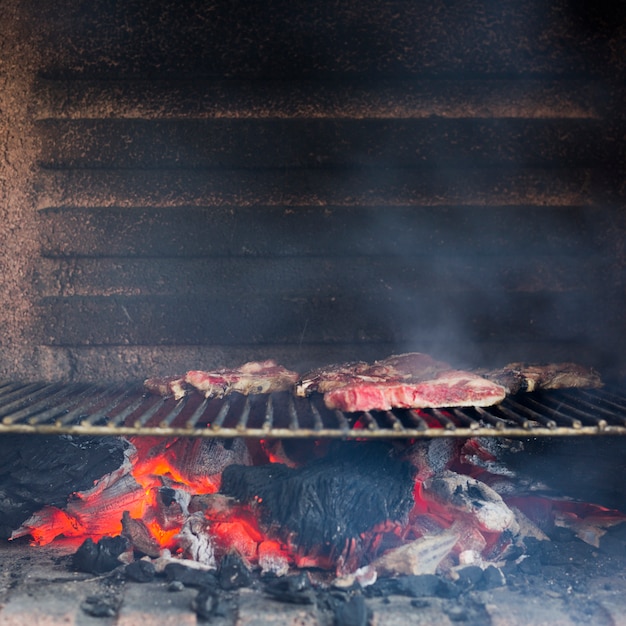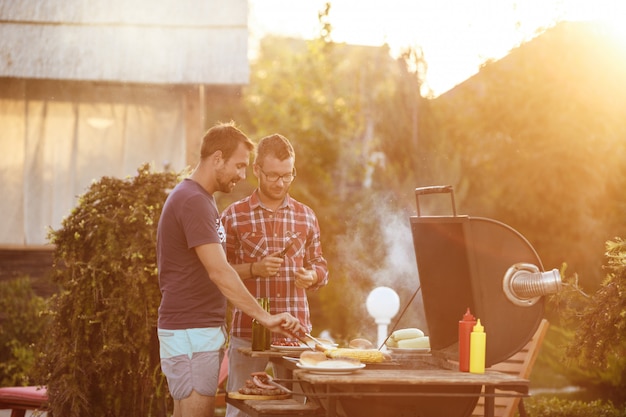Can you smoke meat on a hooded BBQ?
Smoking meat is a centuries-old cooking technique that infuses delicious flavors into your favorite cuts of meat, creating a tender and succulent result. Traditionally, smoking meat was done using large, dedicated smokers or pits. However, many BBQ enthusiasts wonder if it is possible to achieve the same results using a hooded BBQ.
The good news is that yes, you can indeed smoke meat on a hooded BBQ! While it may not be as traditional as using a dedicated smoker, a hooded BBQ offers a convenient and accessible way to enjoy the art of smoking meat right in your own backyard.
The Basics of Smoking Meat on a Hooded BBQ
To smoke meat on a hooded BBQ, you will need a few essential tools and a basic understanding of the smoking process. Here are the key steps:
- Choose the Right BBQ: Look for a hooded BBQ that has a tight-fitting lid and adjustable vents to control the airflow.
- Select the Wood: Choose the type of wood chips or chunks you want to use for smoking. Different woods offer different flavors, so experiment to find your favorite.
- Prepare the Meat: Season your meat with a dry rub or marinade of your choice. Allow the flavors to penetrate by refrigerating the meat for a few hours or overnight.
- Set up the BBQ: Fill a smoker box or aluminum foil pouch with soaked wood chips or chunks. Place it on one side of the BBQ’s grill, directly over the heat source.
- Preheat and Control Temperature: Preheat your BBQ to the desired smoking temperature, typically between 225°F (107°C) and 275°F (135°C). Use the adjustable vents to maintain a consistent temperature throughout the cooking process.
- Smoke the Meat: Place your seasoned meat on the grill grates on the opposite side of the heat source, away from the smoker box. Close the lid and let the magic happen! The smoke from the wood chips will infuse the meat with incredible flavors as it slowly cooks.
- Monitor and Maintain: Keep an eye on the temperature and add more soaked wood chips or chunks as needed to maintain a steady flow of smoke. Avoid opening the lid too frequently, as this can cause temperature fluctuations.
- Check for Doneness: Use a meat thermometer to ensure your meat reaches the desired internal temperature for doneness. Different cuts of meat have different ideal temperatures, so consult a cooking guide for accurate readings.
- Rest and Enjoy: Once your meat is cooked to perfection, remove it from the BBQ and let it rest for a few minutes. This allows the juices to redistribute, resulting in a moist and flavorful final product.
The Benefits of Smoking Meat on a Hooded BBQ
Smoking meat on a hooded BBQ offers several advantages over traditional smokers or pits. Here are a few benefits:
“Using a hooded BBQ for smoking meat allows you to enjoy the smoky flavors without the need for specialized equipment. It’s a versatile cooking method that combines the convenience of a BBQ with the slow and low heat of traditional smoking.”
- Convenience: Hooded BBQs are typically more widely available and easier to acquire than dedicated smokers. You can use your existing BBQ to experiment with smoking techniques without investing in a separate appliance.
- Space-saving: If you have limited outdoor space, a hooded BBQ eliminates the need for an additional smoker or pit. You can enjoy the benefits of smoking meat without sacrificing valuable real estate in your backyard.
- Versatility: A hooded BBQ offers the ability to cook with both direct and indirect heat. This means you can not only smoke meat but also grill, roast, or bake other delicious dishes, making it a versatile cooking tool for all occasions.
- Control over Temperature: Hooded BBQs often come equipped with adjustable vents, allowing you to regulate the airflow and maintain a consistent temperature throughout the smoking process. This level of control ensures your meat cooks evenly and absorbs the perfect amount of smoky goodness.
In conclusion, smoking meat on a hooded BBQ is not only possible but also a convenient and effective way to achieve exceptional flavors. With the right tools, techniques, and a little patience, you can smoke mouthwatering briskets, ribs, or even poultry right in your own backyard. So fire up your hooded BBQ, gather your favorite wood chips, and get ready to impress your friends and family with your newfound smoking skills!
Can a smoker replace a BBQ?
When it comes to outdoor cooking, barbecues have long been a staple for many households in the UK. However, in recent years, smokers have gained popularity as an alternative to traditional grilling. Smokers offer a unique way to cook food, infusing it with delicious smoky flavors. But can a smoker really replace a BBQ? Let’s explore the differences and similarities between the two.
Barbecues
Barbecues are designed for direct grilling over an open flame. They typically use charcoal, gas, or electric heat sources to cook food quickly at high temperatures. Barbecues are versatile and can be used to cook a variety of foods, including burgers, sausages, and vegetables. They are perfect for those who prefer a faster cooking method and enjoy the classic taste of grilled food.
Smokers
Smokers, on the other hand, are designed for slow cooking and smoking at low temperatures. They use wood chips or chunks to create smoke that flavors the food as it cooks. Smokers are excellent for cooking larger cuts of meat, such as brisket, ribs, or pulled pork, as well as infusing a deep smoky flavor into fish and vegetables. The slow cooking process results in tender, moist, and flavorful dishes that can’t be replicated by traditional grilling methods.
Can a smoker replace a BBQ?
While smokers offer a unique cooking experience and produce delicious results, they may not necessarily replace a BBQ. The two cooking methods serve different purposes, and each has its own advantages. If you enjoy quick cooking and the unmistakable taste of charred food, a BBQ is still the way to go. On the other hand, if you’re willing to invest more time and enjoy experimenting with flavors, a smoker can be a fantastic addition to your outdoor cooking arsenal. Consider owning both if you have the space and budget available.
“While smokers offer a unique cooking experience and produce delicious results, they may not necessarily replace a BBQ.”
To help you decide between a BBQ and a smoker, here’s a comparison table:
| Feature | Barbecue | Smoker |
|---|---|---|
| Cooking Time | Quick | Slow |
| Heat Source | Charcoal, gas, electric | Wood chips or chunks |
| Food Types | Burgers, sausages, vegetables | Brisket, ribs, pulled pork, fish, vegetables |
| Flavor | Classic grilled taste | Deep smoky flavor |
In conclusion, while a smoker can provide a unique cooking experience and add delicious smoky flavors to your dishes, it may not entirely replace a BBQ. Both cooking methods have their own advantages and are suited for different types of food and preferences. Consider your cooking style, time availability, and desired flavors when deciding which option is best for you. Ultimately, having both a BBQ and a smoker can offer the best of both worlds and expand your outdoor cooking repertoire.
Do smokers work in winter?
Winter weather brings about various challenges for smokers, with low temperatures, wind, and rain making the smoking experience less pleasant. However, many smokers are resilient and continue to smoke even during the colder months. Let’s explore how smokers navigate the winter season.
Smoking outdoors in winter
Despite the unfavorable weather conditions, smokers can still be seen stepping outside to indulge in their habit. Cold temperatures may affect the experience, but smokers often find ways to adapt. Some common strategies include:
- Bundling up with warm clothing, including hats, scarves, gloves, and coats.
- Finding sheltered areas, such as covered porches or designated smoking areas, to minimize exposure to wind and rain.
- Using lighters or portable heaters to keep warm during smoking breaks.
The impact on work productivity
Smoking breaks, whether in winter or any other season, can have an impact on work productivity. However, it is essential to note that smokers are often aware of this and try to manage their breaks responsibly. By planning their breaks effectively and ensuring they are not taking excessive time away from work, smokers can maintain a balance between their habit and work tasks.
“Smokers understand the importance of being considerate towards their colleagues and employers, especially during busy periods.”
Coping with cold-related health issues
Winter poses additional health challenges for smokers due to the combination of cold temperatures and smoking’s effect on the respiratory system. The risk of coughing, shortness of breath, and other respiratory symptoms may increase during this time. Smokers should prioritize their health and consider taking extra precautions, such as:
- Limiting smoking frequency to reduce overall exposure.
- Staying hydrated to minimize the drying effect of both smoking and cold weather.
- Seeking medical advice for any persistent or concerning respiratory symptoms.
In conclusion, while winter can present challenges for smokers, many continue to smoke and find ways to adapt to the colder weather. With proper planning and consideration for others, smokers can manage their habit without significantly impacting their work productivity. However, it is important for smokers to prioritize their health and take necessary precautions during the winter season.



